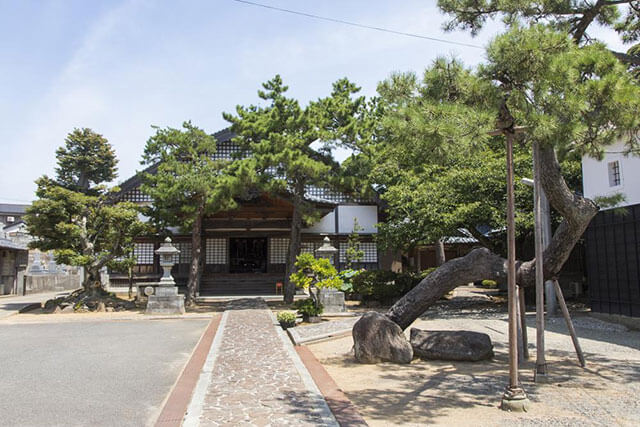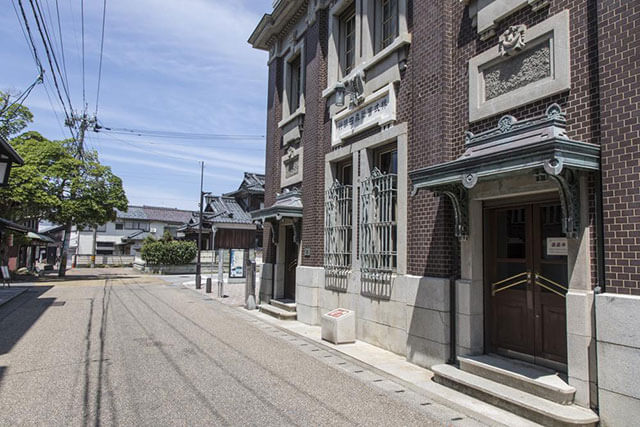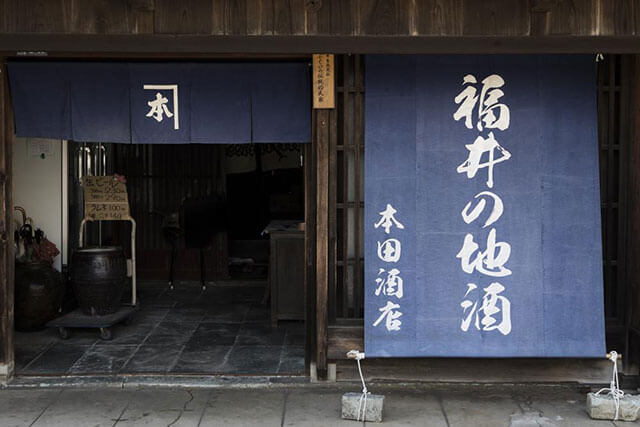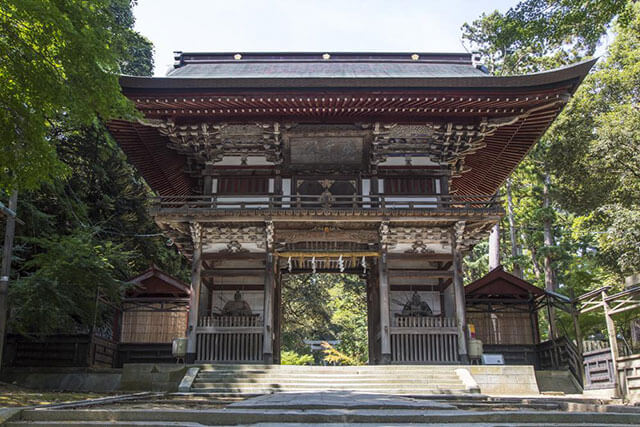
One of the most disorienting things about historical sites is often their isolation from our modern centers. Nowadays, it's certainly quicker to get from the new centers of the country in Kanto or Kansai to the west coast of Honshu, but a port town like Mikuni feels far more peripheral than it would have in its heyday as a locus of trade and commerce. The town no longer exists, even, as a discrete entity, having been absorbed into the sprawling Sakai City. Its meaning changed as it slid into the periphery—the samurai, the men that grew wealthy from trade, the bureaucrats and their Dutch advisors are gone, but their mansions and temples are now tended to, kept up by the families that were here long before they arrived.
-
![]()
Mikuni flourished as a node on the coastal shipping route that linked Honshu to northern Japan during the Edo. The mighty Kitamebune, stout freighters with square sails, eventually replaced by Western schooners, offloaded northern commodities in the port, enriching the traders of Mikuni. The evidence of that wealth remains in the well-preserved streets of the town. A guest house, Tsumesho Mikuni, offers a chance to stay in one of the port’s old townhouses. The project is one of many rural revitalization projects undertaken by Alex Kerr, one of the greatest living evangelists for preserving the culture and traditions of rural Japan. The pretty guest house has become a destination in its own right; staying true to Alex Kerr’s vision, Tsumesho Mikuni welcomes a limited number of guests and showcases traditional ways of building and living.
![]()
Mikuni Minatoza is another building saved by rehabilitation; apart from the homey dishes in the dining room, you might also stop by to take part in one of the events hosted by the local tourism boosters. Behind the original facade, the building now functions as a cultural hub, tourist drop-in center, and a restaurant. If you’re interested in meeting up with locals or just want to pick up some local sweets, stop by. It’s a great chance to get a closer look at the local architecture.
![]()
Another result of the town drifting into the periphery is that it attracts people interested in disconnecting from the buzzing center of the country. Shimomura Yoshikatsu, a bonsai master, is one of those that have found a home in the old port town. The tastefully renovated building, renamed Mikuni En, not far from Mikuni Minatoza, is the perfect setting for the master to work at his art. Mikuni En houses the master’s workspace, as well as a shop selling his creations.
![]()
- Mikuni Minatoza
-
3.5
20 Reviews -
-
- Fukui Sakai-shi Mikunicho Kitahonmachi 4-6-48
-
-
-
- 0776813921
-
-
-
- 10:00-17:00
-
View AllAuberge Homachi Mikuniminato
3 Chome-4-39 Mikunicho Minamihonmachi, Sakai-shi Fukui

- Mikuni Sono Mikuni Minato
-
-
- Fukui Sakai-shi Mikunicho Minamihonmachi 3-chome 2-10
-
-
-
- 0776502548
-
View AllAuberge Homachi Mikuniminato
3 Chome-4-39 Mikunicho Minamihonmachi, Sakai-shi Fukui

The stern edifice of the old Morita Bank building is the surest sign that this place used to mean something. The brick fortress, built in 1920, housed the operations of the bank patronized by local merchants until the economy shifted away from coastal trade and Morita Bank was gobbled up by Fukui Bank. Ownership of the building fell to the local municipality, who have renovated the formerly crumbling bank. The building has become another hub of the local community, playing host to exhibitions and concerts; it’s now open to the public and signs throughout elucidate the history of the building.
![]()
- Former Morita Bank Headquarters
-
4.0
40 Reviews -
-
- Fukui Sakai-shi Mikunicho Minamihonmachi 3-3-26
-
-
-
- 0776820299
-
-
-
- 9:00-17:00
-
View AllAuberge Homachi Mikuniminato
3 Chome-4-39 Mikunicho Minamihonmachi, Sakai-shi Fukui

Mikuni’s surrounding countryside has some of the finest soil and conditions for cultivating rice. The wealth of Mikuni was built not only on the sea trade and fishery but also rice and sake. Mikuni’s Jizake can be sampled at a number of shops in town, including some along the alleys of the old town.
![]()
Mikuni Shrine has a history that stretches back further than Mikuni’s time as a boom town. The shrine was supported by the merchants and samurai that built their mansions along the river but its roots are as a place to house the rites of the local farmers and fishermen. The shrine is a peaceful oasis in the already peaceful town.
- Mikuni Shrine
-
3.5
8 Reviews -
-
- Fukui Sakai-shi Mikunicho Sanno 6-2-80
-
-
-
- 0776812514
-
-
-
- [Counter/Telephone reception…
-
View AllAuberge Homachi Mikuniminato
3 Chome-4-39 Mikunicho Minamihonmachi, Sakai-shi Fukui






 Go here
Go here















